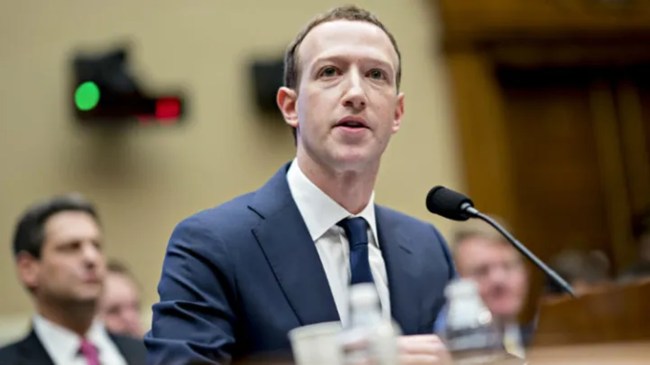Opinion Dear Mark Zuckerberg, do we really need more masculine energy?
His lament on the loss of macho energy in corporate culture, in a podcast with Joe Rogan, casts the oligarch as a responsibility-shrugging man-child. It's a masculinity that tries to pass of moral failure as moral high ground and opportunism as strategic foresight
 For someone whose stupendous success can be traced back to an airing of casual misogyny — Mark Zuckerberg's social network began as a platform on which he and his Harvard classmates could rank female students by their appearance.
For someone whose stupendous success can be traced back to an airing of casual misogyny — Mark Zuckerberg's social network began as a platform on which he and his Harvard classmates could rank female students by their appearance. Mark Zuckerberg has a complaint and it has nothing to do with how a lack of fact-checking might render his social media platforms vulnerable to hate. Instead, his consternation stems from an apparent emasculation of the corporate industry. In a near-three-hour podcast with Joe Rogan, a beefed-up Zuckerberg rued, “I think a lot of the corporate world is pretty culturally neutered. Masculine energy is good, and obviously, society has plenty of that, but I think corporate culture was really trying to get away from it.”
It must be my exhausted female energy, already reeling from home-grown tech bros insisting on manning up for 70 to 90 hour work weeks to build character, the future, the company’s balance sheet, the nation (never say they don’t give you choice or flexibility), trying to hit its masculine tenor: The Meta CEO’s call for “a culture that celebrates the aggression a bit more” and “has its own merits that are really positive” does a fine job of getting the hackles up. Across countries, men occupy the highest-paying jobs and top positions in organisations.
In India, for instance, a report released in May 2024, ‘Women in Leadership in Corporate India’ by LinkedIn in collaboration with The Quantum Hub, a Delhi-based consultancy, indicates a modest increase in women’s participation in the corporate workforce — the proportion of women rose from 23.9 per cent in 2016 to 26.8 per cent in early 2024. The representation of women in senior management roles remained only 18.3 per cent, underscoring, not for the first time, the gender disparity within corporate hierarchies.
In the US, ground zero of Zuckerberg’s empire, the scene is not very different. Women run only 10 per cent of the Fortune 500 companies. According to McKinsey and Company’s Women in the Workforce 2024: The 10th Anniversary Report, “Women remain underrepresented at every stage of the corporate pipeline, regardless of race and ethnicity”. They remain less likely to be hired at the entry level and less likely to get to a managerial position at the same time as a man at the same level. In 2018, for every 100 men who received their first promotion to manager, 79 women were promoted. In 2024, the number marginally increased to 81 women. For women of colour, the situation, needless to add, is worse.
With masculine energy already so pervasive, does the world really need more of it? Zuckerberg certainly thinks there’s no such thing as too much of a good thing. In the podcast, he glided over “female energy” as necessary, but the subtext read “inadequate” in big bold letters. For someone whose stupendous success can be traced back to an airing of casual misogyny — his social network began as a platform on which he and his Harvard classmates could rank female students by their appearance — equating “masculinity” with “aggression” is perhaps par for the course. His idea of manhood — a boys’ club that wants everyone to play by their fast-changing rules and cries foul when someone points out that the rules aren’t fair — is far removed from the aspirational imagination of contemporary masculinity: To be open, inclusive and diverse. The kind that one of Zuckerberg’s former COOs, Sheryl Sandberg, had advocated during her tenure in the company. Meta, of course, no longer believes in leaning in; its ethics are coded in profit margins. In fact, in another podcast with David Rosenthal and Ben Gilbert, last September, Zuckerberg claimed that he was done with apologising for problems that were never his to begin with. In other words, he is unbothered, arrogant, happy to change lanes frequently and focused on flourishing.
This masculinity, as it stands then, defines itself by its ability to shrug off responsibility as liability, it places moral failures as high moral ground and garbs opportunism as strategic foresight. It relies on a sort of performative persona that casts the oligarch as the man-child who must have his way because isn’t that how things are supposed to be — the world keeling over (or he bending over backwards) in an effort to smoothen his path?
But then, perhaps, one need not wonder so much about what a return to a (more) testosterone-driven culture might be like. His more diverse cabinet notwithstanding, the new male playbook is likely to be on display at Donald Trump’s second coming as the US President today. Reports suggest that the billionaire fan club of Elon Musk, Jeff Bezos and Zuckerberg will be in attendance to show their support for and allegiance to macho energy.
Any quibbles over equity, balance or facts can be mansplained away in the days to come.
paromita.chakrabarti@expressindia.com



